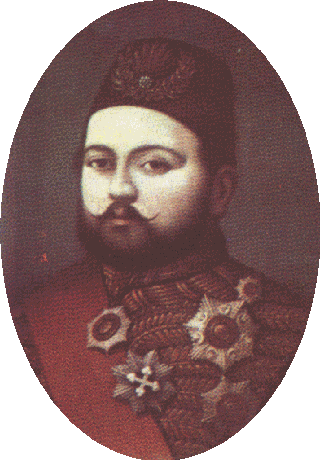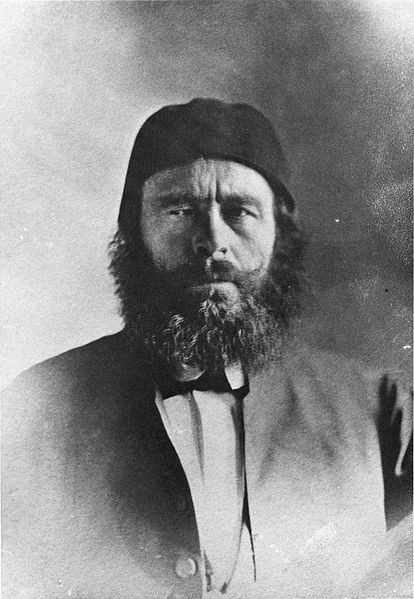<Back to Index>
- Wāli of Egypt, Sudan, Hejaz, Morea, Thasos and Crete Abbas Hilmi I Pasha, 1812
- Wāli of Egypt and Sudan Muhammad Sa'id Pasha, 1822
PAGE SPONSOR

Abbas I (July 1, 1812 - July 13, 1854) (Arabic: عباس الأول), also known as Abbas Hilmi I Pasha, was the Wāli of Egypt and Sudan. He was a son of Tusun Pasha, and a grandson of Muhammad Ali, founder of the reigning Muhammad Ali Dynasty of Egypt and Sudan. The Chambers Biographical Dictionary says of him: "[b]igoted and sensual, he did much to undo the progress made under Muhammad Ali."
He was born in 1812 in Jeddah and was brought up in Egypt. Being the grandson of Muhammad Ali, he succeeded his uncle Ibrahim Pasha in ruling Egypt and Sudan in 1848.
According to al-Jabarti, the leading historian of this time period, Abbas I was born in Cairo while his father, Tusun Pasha, was in the Hejaz fighting against the Wahabist movement. As a young man, he fought in the Levant under his uncle Ibrahim Pasha. Muhammad Ali Pasha was removed from office on September 1, 1848, on account of mental weakness. He was replaced by his adopted son Ibrahim Pasha, who reigned briefly as Regent of Egypt and Sudan from September 1, 1848 until his death on November 10, 1848. The death of Ibrahim made Abbas I, in turn, Regent of Egypt and Sudan from November 10, 1848 until August 2, 1849 (the date of Muhammad Ali Pasha's death), at which time Abbas became the reigning Wali of Egypt and Sudan until July 13, 1854).
He has been often described as a mere voluptuary, but Nubar Pasha spoke of him as a true gentleman of the "old school". He was seen as reactionary, morose and taciturn, and spent nearly all his time in his palace. He undid, as far as lay in his power, the works of his grandfather, both good and bad. Among other things he abolished trade monopolies, closed factories and schools, and reduced the strength of the region's army to 9,000 men.
He was inaccessible to adventurers bent on plundering Egypt and Sudan of riches, but at the insistence of the British government, he allowed the construction of a railway from Alexandria to Cairo.
Among his personal interests was the breeding of Arabian horses, continuing a breeding program begun by Muhammad Ali. While Egypt was not particularly known for horse-breeding in the time, the rulers of Egypt obtained horses as payment for taxes and tribute. Muhammad Ali and Abbas I both recognized the unique characteristics and careful attention to bloodlines of the horses bred by the bedouin, particularly in the Anazeh and the Nejd. Thus each ruler accumulated significant numbers of high quality animals through both diplomacy and force.
In July 1854 he was murdered in Benha Palace by two of his slaves, and was later succeeded by his uncle (who was actually younger than him), Said Pasha.
Following his assassination, his Arabian horses were
inherited by his eighteen year old son Ibrahim
Ilhami Pasha (a.k.a. El Hami
Pasha), who had little interest in them, giving
away several and putting the rest up for auction. In 1861,
a distant relative, Ali Pasha Sherif purchased
approximately 30 horses of the original Abbas Pasha stock
and rebuilt the horse breeding program.

Muhammad Sa'id Pasha (March 17, 1822 - January 17, 1863) was the Wāli of Egypt and Sudan from 1854 until 1863, officially owing fealty to the Ottoman Sultan but in practice exercising virtual independence. He was the fourth son of Muhammad Ali Pasha. Sa'id was a Francophone, educated in Paris.
Under Sa'id's rule there were several law, land and tax reforms. Some modernization of Egyptian and Sudanese infrastructure also occurred using western loans. In 1854 the first act of concession of land for the Suez Canal was granted, to a French businessman Ferdinand de Lesseps. The British opposed a Frenchman building the canal and persuaded the Ottoman Empire to deny its permission for two years.
Sudan had been conquered by his father in 1821 and incorporated into his Egyptian realm, mainly in order to seize slaves for his army. Slave raids (the annual 'razzia') also ventured beyond Sudan into Kordofan and Ethiopia. Facing European pressure to abolish official Egyptian slave raids in the Sudan, Sa'id issued a decree banning raids. Freelance slave traders ignored his decree.
As a result of the American Civil War, the export of Egyptian cotton surged during Sa'id's rule to become the main source for European mills. At the behest of Napoleon III in 1863, Sa'id dispatched part of a Sudanese battalion to Mexico to help put down a rebellion there.
Under Sa'id's rule the influence of sheikhs was curbed and many Bedouin reverted to nomadic raiding.
In 1854 he established the Bank of Egypt. In the same year Egypt's first standard gauge railway was opened, between Kafr el-Zayyat on the Rosetta branch of the Nile and Alexandria.
Sa'id's heir presumptive, Ahmad Rifaat, drowned in 1858 at Kafr el-Zayyat when a railway train on which he was traveling fell off a car float into the Nile. Therefore when Sa'id died in January 1863 he was succeeded by his nephew Ismail.
The Mediterranean port of Port Said is named after him.